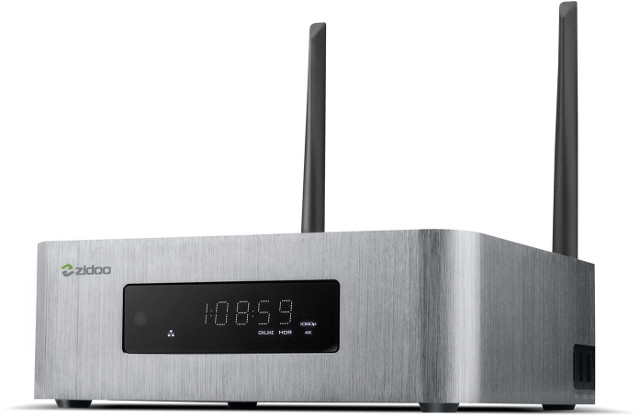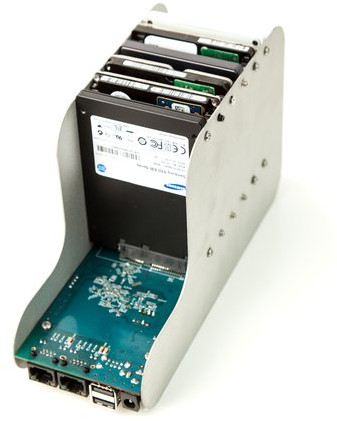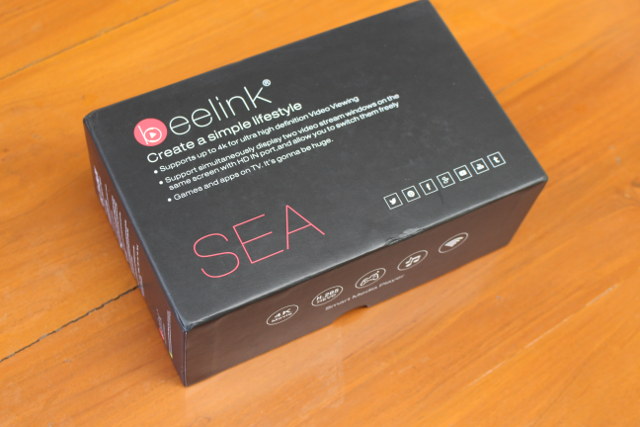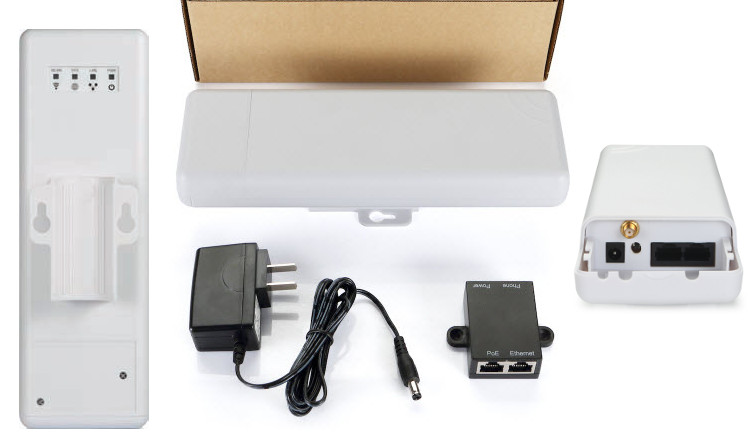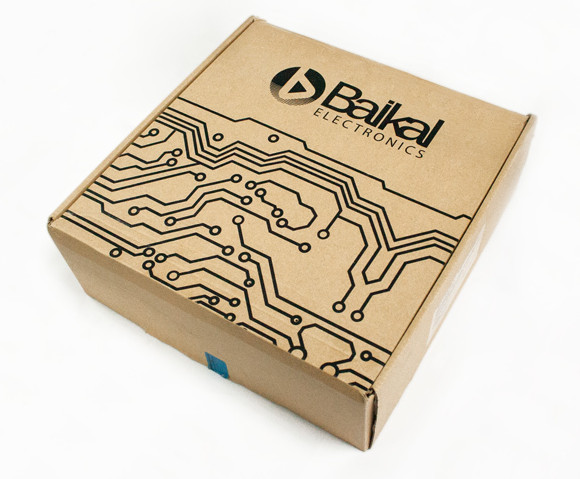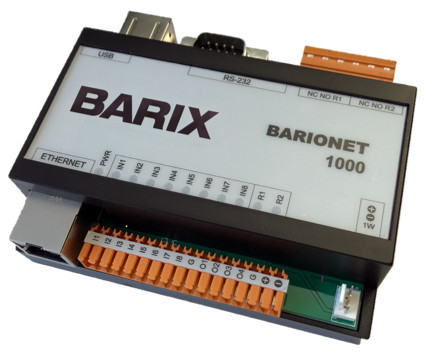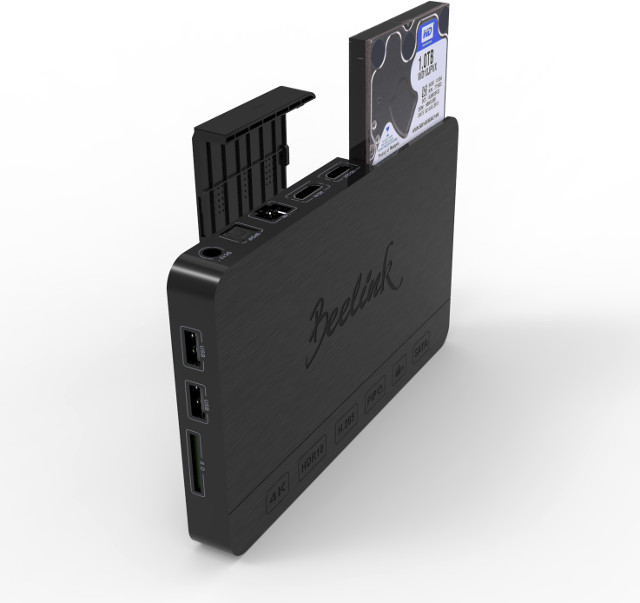Zidoo has sold two TV boxes based on Realtek RTD1295 so far with Zidoo X9S and Zidoo X8, and the company has done a pretty good job based on my review of Zidoo X9S. Both models run Android 6.0 with HDMI input recording and broadcasting functions, as well as OpenWrt for NAS functions, with X8 model relying on USB 3.0 storage, and X9S adding an external SATA port. It would be nice to have a model with an internal SATA bay, and it’s exactly what Zidoo X10 brings to the table. Zidoo X10 specifications with highlights in bold showing differences with Zidoo X9S: SoC – Realtek RTD1295 quad core Cortex A53 processor with ARM Mali-T820 MP3 GPU System Memory – 2GB DDR3 Storage – 16GB eMMC flash + micro SD slot up to 32GB + SATA 3.0 bay for 3.5″ hard drives Video I/O – HDMI 2.0a output up to […]
GnuBee Personal Cloud 1 Low Cost Linux NAS Supports Up to Six 2.5″ SATA Drives (Crowdfunding)
Networked Access Storage (NAS) with a large number of SATA bays usually cost several hundreds dollars up to thousands of dollars depending on the features set and performance, but there’s a new a project called GnuBee Personal Cloud 1, or GB-PC1, that delivers a MIPS Linux system supporting up to six 2.5″ SATA drives for less than $200. GB-PC1 NAS specifications: Processor – MediaTek MT7621A dual core, quad thread processor @ 880 MHz, overclockable to 1.2 GHz System Memory – 512 MB DDR3 Storage – micro SD card slot tested up to 64 GB, 6x 2.5” SATA HDD or SSD Connectivity – Dual Gigabit Ethernet USB – 1x USB 3.0 port, 2x USB 2.0 ports Serial port – 3-pin J1 connector or 3.5 mm audio-type jack Power – 12 VDC @ 3 A via 5.5 mm x 2.1 mm, center-positive barrel jack Dimensions – 21.6 cm (L) x 7 cm […]
Beelink SEA I Android TV Box, and HDMI Recorder Review – Part 1: Unboxing and Teardown
Realtek RTD1295 SoC is so far found in devices running Android & OpenWrt, and equipped with an HDMI input port for recording, PiP, and UDP broadcasting. I have already reviewed Zidoo X9S with an external SATA port, and Eweat R9 Plus with a 3.5″ SATA bay, and I’ve now received Beelink SEA I offering another option thanks to 2.5″ SATA bay, and a lower price of $98.99 and up using coupon GBSEA16 with the 2GB/16GB version, or GBSEA32 with the 2GB/32GB version. As usual, I’ll start with some photos and a teardown in the first part of the review, before testing the firmware in more details. Beelink SEA I Unboxing Photos I’ve received the box in the retail package below showing some of the features like 4K video playback, picture-in-picture thanks to the HDMI input, and supports for games and apps. Beelink SEA I comes with either 16GB or 32GB […]
Dragino OLG01 Outdoor Single Channel LoRa Gateway Runs OpenWrt, Supports Passive PoE
Dragino Technology, a Shenzhen based startup focusing on the Internet of Things, had already designed LoRa shields & Hats for Arduino & Raspberry Pi boards which can be useful for LoRa nodes, but the company has now launched Dragino OLG01 LoRa gateway running OpenWrt that communicates with nodes over LoRa, and to the cloud using WiFi, Ethernet, or 3G/4G. Dragino OLG01 specifications: WiSoC – Atheros AR9331 MIPS processor @ 400MHz System Memory – 64MB RAM Storage – 16MB flash MCU – Atmel ATMega328P AVR MCU with 32KB flash, 2KB SRAM Connectivity 802.11 b/g/n WiFi with antenna 2x 10/100M Ethernet with support for passive PoE Optional 3G/4G module connected to internal USB socket (TBC) Semtech SX1276/78 LoRa wireless module + SMA connector (antenna not provided) up to 5~10 km range USB – 1x USB 2.0 host port Power Supply – 12V DC power jack or PoE Three models are offered with […]
Baikal T1 BFK 1.6 MIPS Development Board Tested with OpenWrt
Baikal Electronics is a Russian fabless semiconductor company specializing in ARM and MIPS-based SoC, and we’ve already covered their Baikal T1 MIPS SoC announcement, as well as Tavolga Terminal TP-T22BT Debian 8 All-in-One Computer based on the processor. The company also have Baikal T1 BFK 1.6 development board, which does not appear to be publicly available yet, but one member of Habrahabr.ru forums got hold of one sample, and tested the OpenWrt SDK in Debian 8 host computer. First, we’ll have a look at the hardware they received. I don’t have the full specs of the board, but we’ll learn a little more below, in the meantime we can see two USB ports, Gigabit Ethernet ports, a 10GbE SFP cage, an mPCIe slot (I think), and two DB9 connector, as well as a bunch of other headers and connectors with SATA, GPIO, UART, I2C, SPI… I’ve then downloaded Baikal T1 BSP […]
Barionet 1000 DIN Rail Programmable I/O Controller Runs OpenWrt
Barix, a Swiss company specializing IP- based communications and control technology, has introduced a new Barionet programmable I/O controller with Barionet 1000, the first model of the company to run Linux, and in this case OpenWrt, and to offer WiFi and USB connectivity. Barionet 1000 specifications: Processor – Undisclosed System Memory – 64MB RAM Storage – 16MB flash Connectivity – 10/100M Ethernet, Wi-Fi 802.11 b/g/n; IPv4 & IPv6 support. USB – 2x USB Host Ports Serial – 1x DB9 RS-232 serial port User programmable I/Os 2x relay outputs (30 VDC max, 5 A) 4x open collector digital outputs (4 x 24 VDC, 0.3 A) 8x contact closure inputs (0 – 15 V), including 4x 12-bit analog inputs (0 – 15 V) 1-wire interface for 18DS20 temperature sensor Misc – 11 LED status indicators Power Supply – 9 to 30V DC (2.5 Watts max) Dimensions – 103mm x 85mm x 31mm; […]
Embedded Linux Conference & OpenIoT Summit 2017 Schedule
The Embedded Linux Conference 2017 and the OpenIoT Summit 2017 will take place earlier than last year, on February 20 – 23, 2017 in Portland, Oregon, USA. This will be the 12th year for ELC, where kernel & system developers, userspace developers, and product vendors meet and collaborate. The schedule has been posted on the Linux Foundation website, and whether you’re going to attend or not, it’s always informative to check out the topics. So as usual, I’ll make a virtual schedule for all 5 days. Monday, February 20 For the first day, the selection is easy, as choices are limited, and the official first day it actually on Tuesday. You can either attend a full-day paid training sessions entitled “Building A Low Powered Smart Appliance Workshop“, and the only session that day: 14:30 – 15:20 – Over-the-air (OTA) Software Updates without Downtime or Service Disruption, by Alfred Bratterud, IncludeOS […]
Beelink SEA TV Box with Realtek RTD1295, HDMI Input and Internal SATA Bay Sells for $105 and Up
I’ve already reviewed two Android TV boxes powered by Realtek RTD1295 processor, namely Zidoo X9S and EWEAT R9 Plus. They are quite interesting devices as beside supporting video & audio playback nicely (minus 4K H.264 @ 30fps), they also serve as a personal NAS thanks to their SATA interface and OpenWrt operating system running alongside Android, as well as a HDMI recorder and streamer thanks to the HDMI input. Zidoo firmware is a little better, but it only comes with external SATA, while EWEAT R9 Plus comes with a neat internal 3.5″ SATA bay inside a metal case. The downside is that it’s quite expensive at $200 shipped. If you’d like a Realtek RTD1295 solution with a SATA bay, but would like something more cost effective, Beelink SEA TV box with might be for you. Beelink SEA specifications: SoC – Realtek RTD1295 quad core ARM Cortex-A53 processor @ 1.4 GHz […]


